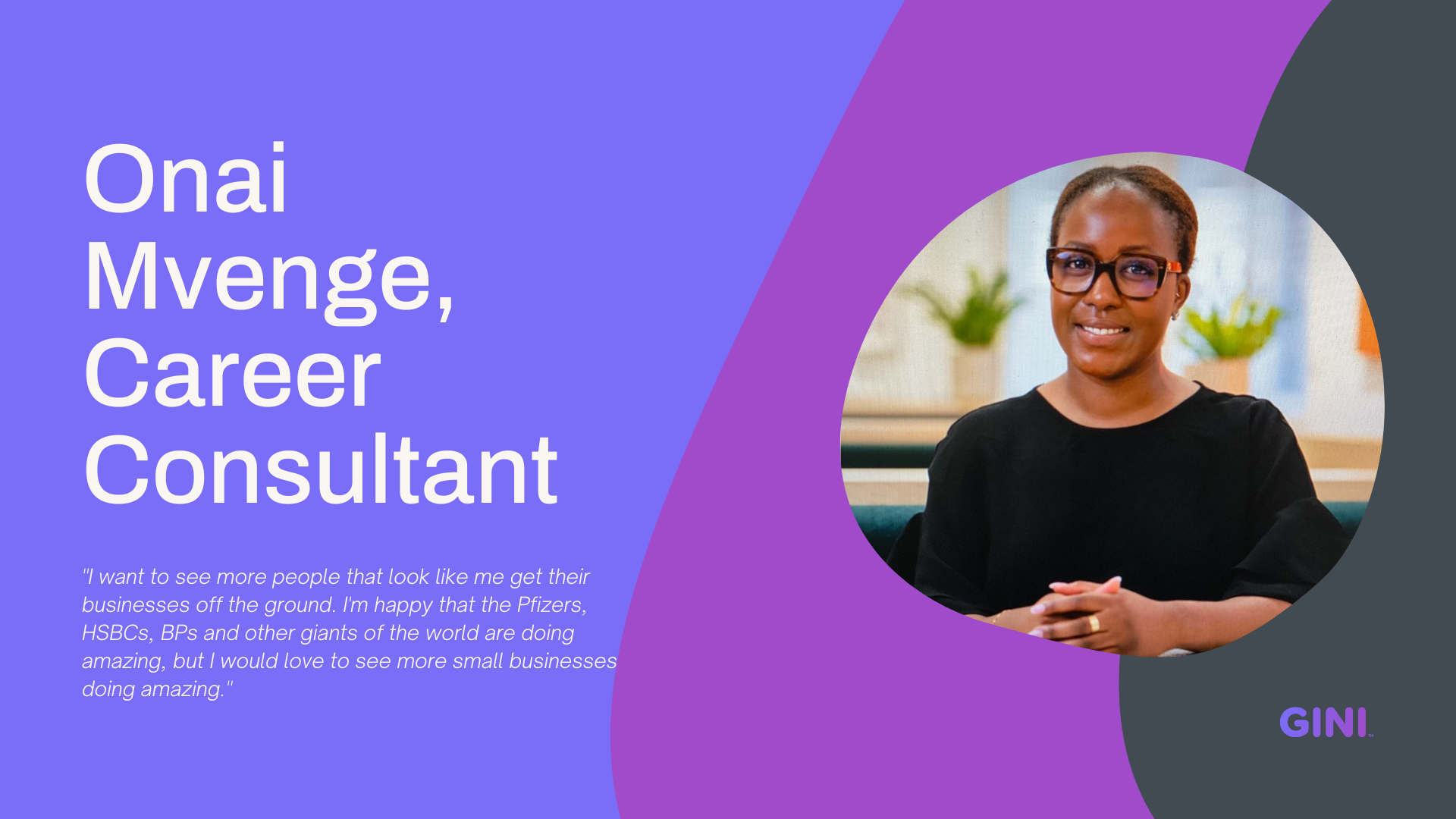GINI: Get Expert Advice On The App Store
GINI: Get Expert Advice On The Google Play Store
By definition, data strategy consulting is a specialized field within strategy and management consulting that focuses on helping companies leverage their data assets for competitive advantage. Through utilizing actionable strategies exclusively made possible from unique past career experiences in data management, analytics, and business intelligence, consultants are able to drive organizations further in their growth and improve their decision-making. The data strategy consulting industry is growing rapidly, and it’s expected to reach over $20 billion. The field is also experiencing an influx of new talent as companies look for experts who can help them gain a competitive edge in the digital economy.
In light of this booming industry, GINI gathered with Onai Mvenge, a veteran large/small/entrepreneurial data strategy consultant, to get real-life tips on the field. This Q&A goes over the specialized field of consulting that focuses on helping individuals navigate career paths within large and small organizations. Onai provides large company-rooted career advice on internal mobility, career development, performance management, and other career-related topics to help employees achieve their goals and advance within their organizations. These types of consultants are often familiar with the specific cultural and structural similarities of small, large, and independent-scaled companies; thus, they can provide tailored advice to individuals wanting to succeed & pivot in their given careers.
Onai, having experience as a minority in tech as a young black woman, truly provides a notoriety-worthy career story about implementing similar methods of data insight consulting strategies across contrasted in size yet similar in operational style company types & models.
GINI Q&A with Veteran Career Consultant - Onai Mvenge
Josh: So essentially, this is going to be a more candid interview. Just looking to receive some insight for our readers on your practices related to consulting. So to start, can you tell the readers a little bit about yourself?
Onai: Of course. My name is Onai. I am a career consultant. I've been in Strategy and Management Consulting for about eight years now. Predominantly, I've been working in Data Strategy, so Business Intelligence and Analytics, sometimes quite technical projects, sometimes more products and market-focused. And so that means I've been working for some pretty large companies for the last eight years.
Over the last year, I decided to start building out a freelance business simply because I wanted to work with a slightly different client base. Being a black woman, I've always been really interested in business. I've always felt entrepreneurial, but never really had the guts to do it myself. So with all the skills I've built from being a consultant for big companies and consulting with some very senior leaders, I wanted to pay it forward. With my freelance business, I help small service-based businesses. I am a bit biased – I want to target minority businesses and women-owned businesses and essentially help them to scale. The more the merrier in the world of business. It's not a zero-sum game. So, the more business owners I can help to grow, the happier I feel within myself, and it's a bonus that I get to do it as a job as well.
Josh: Wow, that's powerful. So how does that relate to consulting work with, let's say, small businesses?
Onai: So, the interesting thing that I found from working with small businesses is that they come across the same problems, albeit on a much smaller scale. But at the end of the day, these are just people who are trying to build businesses. And so the issues that they're facing, whether that's on a personal level i.e., “I don't know how to manage my time” or “I don't know what to prioritize”, or “I don't know what my strengths are”, or whether it's more so an operations type of issue, like, “I don't know how to build/improve this process in my business”, or “I don't know how to target this new market”; whatever the nature of the issue is that I'm dealing with the small business, it's the same kind of issues that I've been helping the Deutsche Banks and the HSBCs and the Pfizers with.
I think once you've seen enough businesses in enough industries as a consultant, you don't get surprised by new problems anymore. The problem might look a bit different; it might be on a slightly smaller scale or even a slightly larger scale, but I think most typical business problems can be resolved by seeking help from an external perspective and even looking to your competitors. And I think being in consulting gives you a unique vantage point because you do get to see a bunch of businesses, and you get to see them from the inside.
Josh: Wow. So, you're saying that as a consultant, you've become very skilled at helping businesses because you've been able to get so much exposure from businesses within different industries.
Onai: Exactly.
Josh: Wow. Awesome. So, you mentioned some businesses oftentimes don't necessarily know how to improve a process, and that's what they're looking to receive consulting for. So, for young businesses or minority or women-owned businesses, is there a standard problem that you are seeing them face?
Onai: I wouldn't say there was a common problem or business process which most small/young/minority-owned businesses are struggling with. If there is, I haven't yet identified it, but I'd say there's a common mentality as an entrepreneur. Entrepreneurship is hard. It's a scary journey, and it's not just something you wake up on a random Tuesday and think I'm going to be a top entrepreneur. It takes a lot of work and dedication. It takes a certain type of person to be tenacious enough to stick with it for the long run.
So, I would say it's more of a common mentality that I observe where it's normal to be fearful. This is not an easy journey, but I see fear to the point of not being able to see yourself as an entrepreneur, not being able to see your strengths, not being able to see that you actually do have something of value that you are bringing into the world. It may not be a brand-new business idea; it may well have been done before but it hasn't been done by you and, if you don't do it, someone else might. That’s ok too – but they won’t be able to do it like you. So just be brave and put your work out there, safe in the knowledge that you have something unique and valuable to contribute to this world.
I think for small businesses and people who are trying to build small companies, that is what I see so often, and I don't blame them. I'd be the same. It's very easy to be blind to your own strengths, and I think it's even harder still when you are trying to get a business off the ground.
Josh: I can say, that is something that I sometimes face during my entrepreneurial journey. You said sometimes you could look at your competitors. Why would someone look at their competitors?
Onai: Oh, my goodness. There's so much value in it. If I’m being really logical about it, data is so valuable in this day and age; companies are selling (your) data that you wouldn't even think was useful.
If you can, there are lots of websites and tools that allow you to take a peek at what your competition is doing. When I say ‘competition’ I mean another company in your industry, a company that you think is doing well, or a company that has built something similar to what you would like to build. If you can, find out things like monthly hits on the website, get a breakdown of the demographics of the customer base, build out a breakdown of their areas of operation or countries of operation, identify and research the products that do particularly well – all of this is incredibly valuable data that you can use to build a picture of what is working well in the industry that you operate.
It's not easy to get a play-by-play of how this business has managed to become successful in this or that domain, obviously, unless you speak to the owner and get them to divulge their secrets, which you wouldn't. Still, if you can get as much information as you can just by observing what your competition is doing and the moves that they're making, that will let you know a lot about the direction the market is going. I think when you run a business, especially if you are an entrepreneur, and especially if it's early, you are very involved in the business, and it's easy to spend a lot of time working in the business as opposed to working on it. Working IN the business involves things like doing admin, replying to emails, customer service, and research. Working ON the business involves taking an aerial or bird's eye view; strategizing, looking at your business, looking at the industry you operate in, and making big or top level moves that keep your company at a competitive edge. And so, when I'm saying look at your competitors, I'm saying: think macro, not micro. I'm saying look outside – not just at competitors even though that's a very good place to look – observe the entire industry and stay abreast of what’s happening. And follow top competitor movements, especially the ones that are doing well.
Josh: Wow. I think I've done some competitive analysis throughout my building journey, but just recently, I discovered a tool that could really give me some insight into, as you mentioned, traffic or customer demographics. So would you say, that's a very key piece of what the consulting businesses you've worked for have done when it comes to consulting?
Onai: Yeah. absolutely. And especially in a post-COVID world, companies are facing problems that they've never faced before. I've never lived through a global pandemic before. None of us have had to deal with some of the challenges thrown up. So I think if you're going to start a business, it's advisable to start a business in an industry that you know at least a little bit. But there's no way for you to know absolutely everything there can be to know before you start.
Sometimes it's a case of starting the business and then learning as you go. Get started first, and then you get good. And part of getting good is understanding how other companies have done what you are trying to do. I'm not saying do it the same way and follow their footsteps exactly, but seek inspiration from everywhere you can, both internally and externally. And if you're trying to solve a problem, there's no sense in reinventing the wheel all the time. If someone's already solved that, try and see how they did it. Save yourself the time. They've already learned the lesson and made the mistakes. You don't have to do that as well.
Josh: Right. I think that's something that a lot of entrepreneurs face. There's this culture of, you need to either have a brand new idea in order to be investment-worthy, or you need to have this amazing product-market fit to even explore an idea. As you mentioned, if you're building a business in an industry that already has these competitors in it, you can look to them and still have room to build your own business.
Onai: And also, it's an analogy that I really like because it resonated so well for me the first time I heard it – and when I heard it was only recently. I thought, how have I never thought about this before? I can't remember where I read or heard it, but the analogy essentially goes like this, customers shop at both Nike and Adidas. It's not like if you shop at one, you cannot shop at the other.
So you are operating in a space where you have competition. That's not necessarily a bad thing; if anything, it's a good thing because it indicates to you that there is a sizable market here, and you can get in on that. Like, there is a pie, and it's already an already established pie, it's almost easy in a sense, all you have to do is find your way into a market that is already there.
Josh: Okay. So, when you approach your engagements with clients, are there specific, let's say, parameters, for lack of better words, that they need to meet in order to work with you?
Onai: I wouldn't say there are many. I strictly work with small businesses. Small is not defined. And I work with businesses that are somewhat established. I'd say those are the only two parameters. You have to be small, and you have to already be in operation and preparing to scale in some way.
I think when a lot of people hear and use the word scale, they think of a company that's about to make huge leaps and bounds. And yeah, sometimes scaling can mean a huge step up to the next level. But sometimes, it's just scaling to the next evolution of your business. So if previously things were extremely manual, and you, yourself, as the owner, were running every single process, scaling might be introducing a new piece of technology or a new tool. This doesn't have to be expensive, by the way. Evolving to the next, more digital version of your business might mean now spending, I don't know, $20 a month to introduce this tool that automates some of your processes for you.
You are using technology in a new and different way, and you, yourself, as the owner, have more time on your hands to go and like I said before, work ON the business and spend less time IN it. You are now building out the business from another angle, whether that's introducing new products, whether that's trying to onboard new clients. It can mean different things to scale. And part of the work that I do with small businesses is helping them see that there are small stepping stones, and you can absolutely make progress in any kind of way that you define as progress. If you want to make huge steps, of course I'll support you, but the small steps are just important as well.
Josh: Okay. You said small business isn't really defined, but for entrepreneurs who are looking to build out a strategy to bring in new customers, is that something that you assist with as well?
Onai: Absolutely. I would provide advice and guidance on how to do it, where to look for customers and sort of how to position your business in the area in which you work. I wouldn't be classed as an extra employee - I will always be external advice that you outsource. So, I wouldn't find the customers for you. But I'd take a process view on things so I'd understand how your lead generation works today as is. And then from my experience with working with all kinds of companies, huge and small and in between, I'd bring you in on, okay, well, this is how I've seen other companies do it, and this is what I've seen work well, and for the particular space that you operate in, here are some of the avenues that you can look to if you haven't looked at them already.
Josh: Awesome. So, are you finding that only businesses that have some sort of revenue, that are established, even if they're small, are the ones who are seeking out consultants? Or is it more so you, as a consultant, seek out the business to offer a way to improve a specific process?
Onai: It's definitely the former. It's a specific type of founder or business owner who finds me. Consultants are expensive. It's a costly direction to go when you need help. I'm just going to name some household names for consulting; when a company engages a PwC or an EY or a Deloitte, it's because this company has the funds to outsource this problem and say “I'm giving this to you, you take care of it.” This is why I say it's a specific type of small business owner who has the wherewithal to think, “okay, I need external help at this point”. And the nature of the help that I give is helping you to scale and to take that next step. It is, like you said, businesses that already have some revenue and businesses that have already factored this line item into the expenses. It's business owners that look at it as an investment because, over time, that investment is going to compound. The time and effort, and money to scale properly and set proper foundations is worth it in the long run.
Josh: Wow. So, that makes me think about the business owner; at what point do they need to say, all right, I should get external help? And also, from your standpoint, as you said, you're external, so in this particular case, you are offering guidance on how to solve an issue. So when these large corporations hire consultants, are you just providing guidance or, rather, on a corporate level? For the guys who have those big budgets to devote to consulting, are you then coming into the organization and doing a full-time role?
Onai: Exactly. That's exactly how it works. So, these companies will purchase people – if we want to put it as simply as we can. They are buying ‘resources’ (people) to come into their organization from these consulting firms. The Consulting firm will then implant these people into the client’s organization. We spring up a team of consultants who are specifically focused on this one piece of work that the client has engaged the consulting company for, and we work on this problem for a predefined period of time and we solve the problem end-to-end during that time period. We identify the problem, diagnose it, design a solution, implement the solution, deliver the finished product as per the contractual agreement, and then we leave and go on to the next client.
Josh: Oh, wow. I just think consulting is so valuable. I wish there was an easier way to get consulting, and I wish people were more open to it earlier, early on, because, like you said, you have the ability to really improve a process that could really make or break your business.
Onai: I agree. And that's the whole reason why I've started this freelance thing, because for people that I know in my life - family, close friends, people who I'm close enough to to know their aspirations or to know that they have a business they're trying to get off the ground - I'm close enough to know that they're struggling and they need help. I think to myself, what you need is a consultant or a coach of some kind, but it's so inaccessible to you because you don't know what's available. But still, even if you did know that consulting or business advisory/business coaching was available to you, it would probably be cost-prohibitive. This is one of the reasons why my services are quite cheap. For a consultant with nearly a decade of experience at huge firms, Big Three and Big Four, I'm very cheap. But for me, it's not about the money, and it's not necessarily about having a huge book of small business clients. I actually just work with one to two, maybe three at a time. It's more about, like I said at the beginning, wanting to see more people that look like me get their businesses off the ground. I'm happy that the Pfizers, HSBCs, BPs and other giants of the world are doing amazing, but I would love to see more small businesses doing amazing. And everything that I've learned from there, I want to bring it over to the demographics that I know wouldn't have had access to this information had I not been around to share it with them.
Josh: Wow. You're so inspiring. And I hope that this platform can really show you and show others that it's just as easy as being connected to the right people and really being able to access resources, no matter where you're at in the world. So that said, that's pretty much the end of the interview. I want to say thank you, Onai, very much because I think you provided a lot of insight into why people should hire a consultant.
Like what you read? Receive exclusionary career consulting advice from Onai through GINI. Additionally, cover the rest of your professional needs by matching with a couple of other selectively chosen for your specific needs GINI Advice Expert Providers.
Explore your various business facets by downloading the GINI Advice Platform App on the App Store or Google Play Store. Video & text-based advice chat selection options are available on a first-come, first-serve basis. The GINI Group, 2023.
GINI: Get Expert Advice On The App Store
GINI: Get Expert Advice On The Google Play Store
Have a similar story? Sign-up to become a GINI Provider
Provider Signup - Login Page The GINI Group, 2023.




